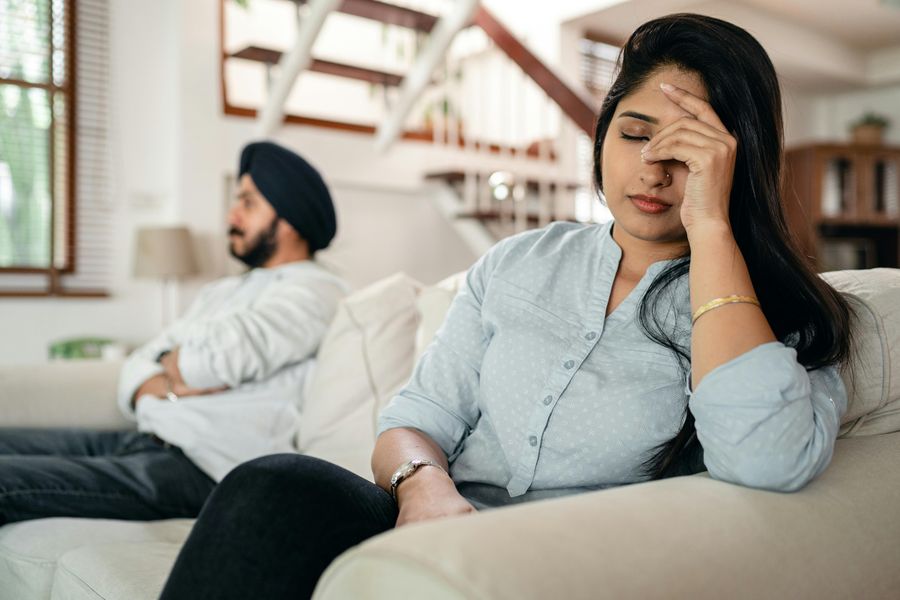Introduction to Marriage Counseling
Marriage counseling. What is it, really?
When many people hear the phrase, they imagine sitting in a cold and sterile office while someone with a notepad asks them personal questions about their romantic relationship. But the truth is that marriage counseling is more than that.
At its heart, marriage counseling is about improving not just your romantic relationship, but your family relationships too.
Benefits of Marriage Counseling for Newlyweds
As a newlywed, you may be feeling excited, happy, nervous, and stressed all at once. It’s normal to have these feelings, but they can take a toll on your relationship if you don’t address them.
This is where marriage counseling can be beneficial. Here are some reasons why:
-
Open Communication
Marriage counseling can help you and your partner communicate more effectively. This means being open, honest, and respectful with each other.
-
Making Discussions Normal
Marriage counseling can create a safe place for you and your partner to talk about anything.
It can make discussing difficult topics seem much less daunting.
-
Reducing Stress
Marriage counseling can help reduce stress by giving you and your partner tools to deal with difficult situations.
-
Reinforcing Values
Marriage counseling can help reinforce the important values that you and your partner share.
-
Preparing for the Future
Marriage counseling can help you and your partner prepare for the future by discussing important topics like starting a family or purchasing a home.
Marriage Counseling Tips for Newlyweds
Now that you know what marriage counseling is and why it can be beneficial, let’s discuss some tips for making the most of it.
-
Keeping Expectations Real
It’s easy to have unrealistic expectations in a romantic relationship. Marriage counseling can help you and your partner keep your expectations realistic.
-
Getting to Know Each Other
Marriage counseling can help you and your partner get to know each other better.
This includes learning about each other’s personality traits, likes and dislikes, and hobbies.
-
Acceptance
It’s important to accept your partner for who they are. Marriage counseling can help you and your partner work towards understanding and accepting each other’s differences.
-
Talking About Finances
Money can be a difficult topic to broach, but it’s important to discuss finances.
Marriage counseling can help you and your partner find a way to talk about money without it becoming a sensitive topic.
-
Division of Chores
Marriage counseling can help you and your partner figure out a division of household chores that works for both of you.
-
Planning for Contingencies
Marriage counseling can help you and your partner plan for unexpected events that may come up in your relationship.
-
Fighting Right
Arguments are normal in any relationship, but it’s important to fight right. Marriage counseling can help you and your partner learn how to argue in a healthy and productive way.
-
Date Nights
It’s important to make time for each other outside of everyday life.
Marriage counseling can suggest ways to incorporate date nights into your routine.
-
Being Honest
Honesty is crucial in any relationship. Marriage counseling can help you and your partner learn how to be honest with each other in a healthy way.
-
Setting Goals
It’s important to have common goals as a couple.
Marriage counseling can help you and your partner set and achieve these goals together.
Importance of Marriage Counseling
Why should newlyweds seek marriage counseling in the first place? Here are some reasons:
-
Trust Has Been Broken
If trust has been broken in your relationship, it can be difficult to rebuild without outside help.
-
Arguments Are Getting More Frequent
If arguments are getting more frequent, it may be a sign that you and your partner need help communicating with each other.
-
Communication is Poor
Poor communication can lead to misunderstandings, resentments, and feelings of disconnection.
-
Unsure of Issues
If you and your partner are unsure of the root of the problems within your relationship, marriage counseling can create a safe space to explore them.
-
Difficult Conversations
Some topics can be difficult to broach with your partner. Marriage counseling can help make these conversations easier.
-
Lack of Emotional Intimacy
Emotional intimacy is vital to a healthy relationship.
Marriage counseling can help you and your partner strengthen this aspect of your relationship.
-
Lack of Physical Intimacy
Physical intimacy is also important in a healthy relationship. Marriage counseling can help you and your partner work towards a healthier sex life.
-
Infidelity
Infidelity can be a huge obstacle to overcome in a relationship.
Marriage counseling can help you and your partner address the hurt and pain that infidelity causes.
-
Mental Health Issues
Mental health issues can take a toll on a relationship. Marriage counseling can help you and your partner work through these challenges together.
-
Non-Traditional Relationships
If you and your partner are in a non-traditional relationship, marriage counseling can help you navigate any unique challenges that come with it.
Conclusion
Marriage counseling is not just for couples on the brink of divorce. Instead, it’s a tool that can help any couple build a healthier and happier relationship.
By keeping expectations realistic, communicating openly, and seeking help when needed, you and your partner can create a loving and fulfilling life together.
Marriage Counseling Procedure:
If you and your partner have decided to seek marriage counseling, you may wonder what to expect during the actual process.
Here’s a look at the typical marriage counseling procedure:
-
Finding a Qualified Counselor:
The first step is to find a qualified counselor who specializes in marriage counseling.
You can ask for referrals from friends or family members, or you can do a quick online search. When looking for a counselor, make sure to read reviews and check their credentials to ensure they are licensed and experienced in marriage counseling.
-
Budget:
Discuss the cost of the sessions and your budget.
Since marriage counseling can be expensive, you should weigh the pros and cons of how much you can invest in the relationship.
-
Counseling Sessions:
During the first few counseling sessions, the counselor seeks to gain an understanding of your relationship, the issues causing conflict, and what you hope to achieve by coming to counseling. They will ask questions to understand each of your perspectives and what you both need from the relationship.
Role of a Marriage Counselor:
A marriage counselor serves as a mediator, guide, and therapist all in one. They assist couples in identifying and resolving issues in their relationships.
Here’s a closer look at what a marriage counselor does:
-
Mediator:
The marriage counselor serves as a neutral party who can facilitate communication between you and your partner and create a safe space where both parties can express their thoughts, feelings, and concerns openly.
-
Guide:
The marriage counselor guides you and your partner through the process of identifying the root of the problems and developing goals that are actionable and achievable.
-
Therapist:
The marriage counselor has specialized training and experience in providing therapy.
They use various techniques to help you and your partner understand and address the issues in your relationship.
Techniques Used in Marriage Counseling:
Various techniques are used in marriage counseling to help couples improve their communication, resolve conflicts, and build better relationships.
Here are some techniques used in marriage counseling:
-
Communication skills:
Marriage counseling helps couples develop healthy communication skills to improve their relationships.
These skills include active listening, expressing oneself clearly, and using I statements.
-
Problem-solving strategies:
Problem-solving strategies used in marriage counseling help couples come up with solutions to problems by brainstorming and evaluating several options before ultimately selecting the best one.
-
Conflict resolution:
Conflict resolutions strategies include compromising, negotiating, and finding common ground to ensure that both parties’ needs and desires are met, leading to more peaceful and harmonious relationships.
-
Behavioral Changes:
Behavioral changes or modifications are interventions that teach couples to change their negative behavior patterns and develop positive ones to improve relationship quality.
-
Coping Mechanisms:
Couples may also learn coping mechanisms to manage stressors within their relationship, such as learning how to de-escalate a disagreement before it becomes a full-blown argument.
Challenges in Marriage Counseling:
While marriage counseling can be an effective way to address marital problems, it can also pose some challenges.
Here are some challenges couples may face while undergoing marriage counseling.
-
Difficulties in Communication:
Couples may face difficulties in communication, which can hinder the counseling process. Ineffective communication, accusations, and misunderstandings can cause more harm than good.
-
Resistance from One or Both Partners:
One or both partners may resist counseling due to denial, fear of vulnerability, or unwillingness to change.
This can result in limited progress from counseling sessions, slowing down progress.
-
Cost and Time Commitment:
Couples may face scheduling conflicts and financial burdens, causing undue stress and limiting their ability to attend counseling sessions consistently.
Conclusion
Marriage counseling can be a beneficial tool for couples experiencing relationship issues. Working with a qualified counselor who specializes in marriage counseling can help create a safe and effective space for couples to learn and practice communication and conflict resolution skills.
The ultimate goal of marriage counseling is to help couples achieve healthier, happier relationships by addressing underlying issues, developing actionable goals and identifying the techniques that best work for their particular relationship.
Importance of Seeking Marriage Counseling for Newlyweds:
Newlywed couples can benefit immensely from marriage counseling.
The first few years of marriage are when many issues arise, and often difficult to navigate. Marriage counseling offers a safe and impartial space where couples can address their issues and work towards building a strong foundation for their married life.
Professional Guidance:
Marriage counseling is designed to provide professional guidance to couples struggling with relationship issues. Counselors and therapists have training and experience in helping couples achieve successful relationships, combining their expertise to help couples navigate challenging situations.
Mental Health:
Marriage counseling can also support mental health. Couples experiencing relationship issues often experience anxiety and stress, which can impact their mental health and well-being.
Therapy can aid in providing emotional support and resources, helping people improve their mental health.
Stronger Communication:
Healthy communication is key to a strong marriage.
Marriage counseling gives couples the opportunity to practice open and honest communication, creating an environment of understanding and compassion that fosters deeper, more meaningful connections between partners.
Encouragement to Seek Help:
There is often a stigma associated with marriage counseling, with many people believing that seeking help is a last resort.
However, it is essential to destigmatize seeking counseling as a normal and beneficial way to address relationship issues. Marriage counseling is a way to prioritize and strengthen the relationship, instead of allowing the problems to persist.
Normalizing:
It is important for couples to normalize the idea of seeking help. As with any aspect of physical health, seeking medical treatment is often encouraged; similarly, seeking counseling for mental health and relationship issues should be normalized and encouraged.
Importance of Addressing Issues:
Addressing relationship issues can lead to a healthier, happier future. Ignoring problems can lead to resentment and long-term damage in the relationship, which is often insurmountable.
Encouraging couples to seek help sooner rather than later can get ahead of any underlying issues and have the best chance for successful resolution.
Conclusion
Marriage counseling offers a range of benefits, including improved communication, stronger relationships, and better mental health. Couples can benefit from seeking it before any major issues surface, giving themselves the opportunity to focus on healthy communication skills and building a strong foundation for a healthy and happy married life.
It is important to encourage couples to take the necessary steps to address their issues instead of letting them fester, ultimately leading to a healthier outlook for the individual and the relationship.
In conclusion, marriage counseling is an effective way for couples to identify and overcome relationship issues, build stronger communication skills, and establish a strong foundation for a healthy and happy marriage.
Seeking professional guidance can aid in improving mental health, normalizing addressing issues, and destigmatizing the process. By encouraging couples to seek intervention sooner rather than later, they can work towards developing actionable goals to grow and strengthen their relationship.
Marriage counseling is an excellent resource in helping couples achieve successful relationships, with professional guidance being key to overcoming relationship conflicts and living a fulfilling life together.



